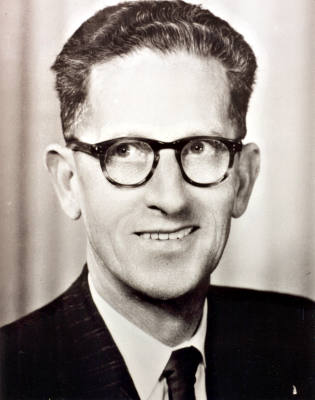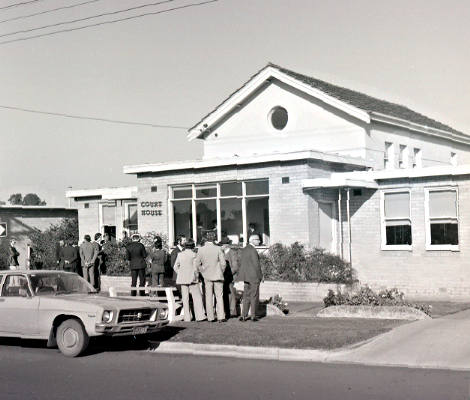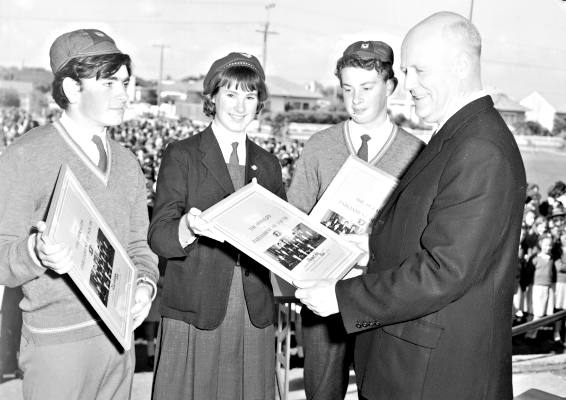Illicit Gambling in the Ti-tree at Mentone
Constable Alex McGregor, in plain clothes, approached two men standing on the foreshore opposite the Mentone Hotel on the afternoon of March 5, 1938. He asked, “What price Conde?” One of the men, Ernest Pippard, responded, “Better ask the Boss.” The second man, Frederick Hayman, then said, “The price by the last ring.” This was the beginning of an action that led to Hayman’s and Pippard’s prosecution under the Police Offences Act at the Cheltenham Court, and a string of editorials and correspondence in the local newspaper on illicit gambling. [1]
Constable George Miller of the gaming police squad told the court that he observed Constable McGregor place two shillings in the hand of the accused Hayman. He also witnessed other betting transactions where Hayman took the money while his colleague recorded the agreement in a book. Miller was also present the next Saturday, sitting in a police car, when Hayman was arrested
Hayman denied he was present at the time of the alleged offence. He was home in bed, he said, and therefore “It was clearly a case of mistaken identity brought on by the youthful zeal of two inexperienced constables.” [2]
At the same court hearing, Reginald Scanlon, a former steeplechase jockey from Mentone, was charged with having indulged in an illegal SP operation opposite the Mentone Hotel but on the week before the incident involving the other two individuals charged. He accepted two bets from a constable, one two shillings each way on Ajax, and a second for two shillings each way on Pantoon. Scanlon admitted taking the bets and realised he was a fool for doing so. Since then, he indicated, he had obtained a job and was giving gambling away.
All three men were found guilty of the charges brought against them, Hayman for conducting an illegal betting operation, Pippard for aiding and abetting an SP transaction, and Scanlon for having indulged in an illegal SP operation. Both Hayman and Pippard had previous ‘form’ with convictions at Mordialloc. A total of £270 was levied against the three men in fines with Hayman being ordered to pay £150. Pippard’s fine was £100, or if in default, six months imprisonment. Scanlon’s penalty was £20
The editor of The News, Eddie Trait, published a letter in the local newspaper the week following the court case in which he aggressively attacked the actions of the police regarding illegal betting and what he saw as exorbitant fines being imposed which crippled families. He wondered whether the Gaming Laws were framed so as to boost Consolidated Revenue rather than stamping out street gambling. The action of the police in the three court cases confirmed his opinion that “stamping out the so called evil was only a secondary consideration.” [3]

Eddie Trait, Editor of the Moorabbin News and General Manager of Standard News, Cheltenham. Courtesy Mordialloc and District Historical Society.
The editor went on to write that there was a lot of cant and humbug surrounding the whole business of illegal gambling. In his view betting could not be extinguished by legislative action as the desire to gamble is born in every one of us. “Our whole life is a gamble,” he suggested. There is nowhere in the Bible that he could find which condemned a man for gambling within his means. A solution to the problems of illegal gambling, he advanced, was to introduce modified betting laws, such as those existing in South Australia, where a person over the age of 21 years could go to an office conducted under strict police supervision, and place a bet without being made to feel like a criminal. One betting shop in each suburb and perhaps two or three in the city would suffice, he thought. This strategy would remove the need for people wishing to place 2/- on a horse having to go to hotel yards or back lanes.
Trait acknowledged that not all his readers would agree with him. There were some people, he believed, who would oppose any encouragement being given to individuals to gamble and this was reflected in the letter from the Rev W Seamer the following week. [4] Seamer disputed the success of the South Australian model to which Trait referred and suggested that many South Australian associations opposed the betting shops. He pointed to the situation of many cricket clubs who had difficulty carrying on because members deserted the field during the progress of a game to place a bet. Healthy sports were being destroyed, he claimed.
Mr Seamer referred to St Paul’s teaching about “abstinence from whatever caused a brother to stumble,” and in the minister’s mind gambling caused many to stumble to their ruin. Jesus Christ, the great example, sought to give, but the gambler’s aim was to get unearned gain, Mr Seamer argued. Therefore gambling is essentially contrary to all sound business or Christian living and as a consequence the community should not legislate for its continuance. [5]
In the same edition of the local paper “S.P” complimented the editor on his outspoken editorial on the betting racket and asked why hundreds of thousands of men should be denied a “mild flutter on their fancy.” … “Is betting to be reserved for the moneyed man,” he asked. While he did not believe in absolute freedom in betting he thought legalised betting shops would do much to lessen the evil of SP betting. [6]
Trait returned to his theme of gambling and the need for legalised betting shops in the News of April 23, 1938. He agreed with Seamer about some weaknesses in the South Australian situation and that gambling causes many to stumble to their ruin, but challenged the minister’s restricted view of gambling. Investing on the Stock Exchange is a gamble as is marriage, where many stumble as do those with extravagant modes of living, or spending money to buy motor cars. The theme was that there are many things besides betting which cause the downfall of people. Moreover, Trait argued, there is nothing immoral in a working man, with 5/- to 10/- pocket money per week for tobacco and a pot, investing a few shillings every Saturday on his equine fancy. However, it would be immoral if a man invested that portion of his wages which was necessary to provide for his family.
The positives of betting shops would include eliminating much of the excessive drinking that occurred on Saturdays, youths and girls would find it difficult to place a bet, those who bet in secret would find themselves exposed and the law, currently seen as sham and humbug, would gain greater respect. Trait concluded his editorial with advice to Mr Seamer. “Unbend a little Mr Seamer. Half a loaf is better than no bread.”[7]
The Rev William Seamer did not let the matter rest. The following week he was writing a lengthy letter to The News which included the subject of illicit gambling. While agreeing that half a loaf was better than nothing he disputed the claim that the establishment of betting shops would lessen drinking, another social evil. After quoting eminent anti-gambling authorities, Seamer wrote, “it must be admitted that every gamble, however small, involves a willingness to gain out of another’s loss, and, therefore, must injure those finer feelings which make man a higher being than an animal.” [8]
On May 25, 1938 three Mentone individuals were charged at the Cheltenham Court with SP betting offences. Alexander Poore, a greengrocer, pleaded guilty to the charge of conducting a common gaming house on his business premises at 129 Mentone Parade. Two other people, Ruby Adlington and Jack Abbott were charged with being on the premises for the purpose of betting.. Adlington did not appear at the court and Abbott pleaded not guilty
Sergeant Alan Roberts told the court that he, in the company of other police entered the fruit shop and found in a back room a telephone on a table. There were also a number of betting slips and 19/- in cash. Poore agreed he was accepting bets but he was doing it for the convenience of his customers. Abbott said he had called in to borrow half a crown from Poore’s wife but several betting slips were found by police bearing his signature. Both Poore and Abbott declined to give evidence on oath and both were convicted. Poore was fined £20 and Abbott, together with Adlington, was fined £1 with the option of 48 hours imprisonment.
Reported court cases at the Cheltenham Court show that illicit gambling was not confined to Mentone. William Love a grocer of South Road, Moorabbin, was brought before the Bench and charged with having had the care and management of a common gaming house. He denied this. Senior Constable Kerr-Taylor, who along with other officers of the Gaming Branch, conducted the search of Love’s shop, reported finding betting slips including two with the names ‘Nipper’ and ‘Dick’. There was a memo pad with some figures which he took to be bets. Also there was a pad hanging near the telephone which had lots of bets written on it.

Cheltenham Court House, 1979. Courtesy Leader Collection.
Love explained to the court that the pad with the bets recorded on it were his own. He rang them through to his bookmakers. There were two with whom he dealt. One was known to him as Nipper and the other Dick. “These people don’t tell you their name, a telephone number is sufficient,” Love explained. When asked to reveal the telephone number he refused, pointing out that they had done him a good turn by taking his bets. After hearing the case for the prosecution and the arguments of the defence the Bench decided to give the defendant the benefit of the doubt and dismissed the charges. [9]
Alfred Stuart, a hairdresser in Highett was not so fortunate as he was found guilty of using his premises for the purpose of betting. He was fined £20 as it was his first offence. Sergeant Le Rue told the court that he found betting slips on the premises and on the person of Alfred Stuart. Stuart explained to Le Rue that his wife was going to the races and had been asked by friends to place some bets for them. The slips found in his pockets were bets received from customers and he intended to pass them to a bookmaker later on. When questioned at the court Stuart said he did it in order to oblige his customers and keep his business together. His lawyer pointed out that many people considered that a hairdresser should provide such a service for customers.
The illegal activity of the starting price bookmaker persisted for many years. People continued to back their judgement on the relative merits of various horses and experience the adrenalin rush when they were successful. Not able to get to a race course to place their bets legally many turned to ‘backyard’ operators, people who would take their bets in shops, private homes, back lanes or hotel yards. Police from the Gaming Squad continued to raid homes, shops and other more open places in an endeavour to stamp out the illegal activity. Courts continued to impose fines, varying in severity according to the part played by an individual and whether he was a repeat offender.
In July 1960 Arthur Elton Johnson, a butcher of Nepean Highway, Mentone, was brought before the court at Mordialloc charged with using shop premises unlawfully for the purpose of betting. He denied the charge but the stipendiary magistrate was satisfied that what the defendant said under oath in the witness box was ‘utterly untrue’. Police from the Gaming Branch had gone to the rear of the premises and found the windows barred and two doors locked. They heard voices and the phone ringing at intervals. After declaring their presence and breaking a window they were admitted. When asked where the betting slips were, Johnson responded, “Don’t know what you’re talking about”, but the police found under a counter a record of bets taken for a Wednesday race meeting. The record showed that 578 bets to the value of £4580 had been received. While the police were present at the shop they answered the phone and took bets for thirty minutes. Those punters whose horses ‘got home’ would no doubt have been very disappointed when they discovered that the police would not be paying their winnings! Johnson was fined £100, or in default three months gaol; a fine not very substantial given the potential profit from bets of over four and a half thousand pounds.
It was the year before Johnson’s court case that Henry Bolte, the Premier of Victoria introduced the second reading speech to legislation aimed at eradicating starting price betting. He acknowledged that a large cross section of people who, though not regular race-goers, took an active interest in horse- racing. This was evident by the fact that the majority of radio stations of Victoria broadcast descriptions of every horse-race run in the metropolitan area. Such a wide coverage would not have been warranted unless a tremendous number of the listeners-in were interested, he claimed. The vast majority of these people are “ordinary, decent, and normally law abiding citizens who simply cannot bring themselves to regard illegal betting as morally wrong or as an offence against the community. Consequently, they have no compunction whenever they feel so inclined, in betting with illegal bookmakers,” Bolte said. [10]
The Premier went on to acknowledge that there was a large section of the community who wanted no change to the existing laws which confined betting to persons in attendance at race-meetings. Moreover, in view of the social evils, both moral and economic, which are associated with starting price betting, they saw the need to appoint additional police and the imposition of heavier penalties to deter and suppress illegal betting. Nevertheless, Bolte said he did not accept this position and referred to the Royal Commission Report of Justice Martin of September1958, who recommended the provision of lawful off course betting arrangements.
Justice Martin found in his enquiries the operations of “standover” men; distress in the home through the bread-winner betting on credit; contempt of the law by persons even of good repute, who desire to bet off-the-course; corruptive pressures exerted by illegal bookmakers on some members of the Police Force and some employees of the telephone branch to accept bribes; and the effect on the public of the unsavoury activities of street bookmakers and their customers.
The government in its draft legislation Racing (Totalizators Extension ) Bill adopted the off-the-course betting system that operated in New Zealand. Off course offices and agencies were to be established throughout the State by the Totalizators Agency Board which was to be set up under the legislation. In addition the government indicated it was its intention to amend the Police Offences Acts in respect to penalties for illegal betting offences. Penalties were to be considerably increased. [11]
The Bill failed to achieve the necessary majority support of the parliamentarians. Government members were allowed to vote according to their conscience and opposition members claimed the Bill was deficient because it did not allow for cash betting. As a consequence a new Bill was drafted correcting this omission and was subsequently passed by the parliament to become law.
Mr Meagher, the Member for Mentone, spoke against the Bill saying that desirable as it may be to beat the evil of starting-price betting, and desirable as it may be to obtain additional revenue for the State, the proposed legislation was not in the long term interests of the community.” [12] His parliamentary colleague Mr Suggett, the Member for Moorabbin, agreed when he indicated he would vote against the Bill. In arguing his stance he acknowledged there was nothing fundamentally wrong with gambling if a person was able to accept the consequences of his actions and provided his speculations did not affect anyone else, but a person who does not indulge in betting is certainly better off economically if not morally. In his view the existence of betting shops would be a temptation for young people to become interested in gambling and for the great majority of people it was not in their interest to have cash betting. Therefore he said he would oppose the Bill. [13]

Mr Meagher as Minister of Transport presents certificates to participants in Parliament Youth Program 1965. Students from Bon Beach High School: Margaret Giles, Arthur Drummond and Phillip Anderson. Courtesy Leader Collection.
The Bill was read for the third time in May 10, 1960, passed by both houses of parliament, and subsequently became law. Although not quite as envisaged first in 1938 by Eddie Trait, the editor of the Standard News papers, it was in the direction he would have welcomed. At least some of the social evils associated with S P Bookmaking were ameliorated if not extinguished. Reputable citizens in placing a wager on a horse at an off course venue were no longer in contempt of the law, the sordid atmosphere of betting in lanes often accompanied by drunkenness ceased, the opportunities for the criminal element to practise stand-over tactics and even assault and robbery passed, and the adoption of questionable practices of the police in order to gain an arrest became
Footnotes
- Moorabbin News, April 3, 1938.
- Ibid.
- Moorabbin News, April 9, 1938.
- Moorabbin News, April 16, 1938.
- Ibid.
- Ibid.
- Moorabbin News, April 23, 1938.
- Moorabbin News, April 30, 1938.
- Moorabbin News, November 11, 1938.
- Parliamentary Debates (Hansard) Volume 258 pages 704-714.
- Ibid.
- Parliamentary Debates (Hansard) Volume 260 page 2820.
- Parliamentary Debates (Hansard) Volume 260 page 2853.
![Mentone Hotel, Beach Road, Mentone [picture].](/sites/default/files/styles/owlcarousel2/public/photos/K001451_banner.jpg?h=2f182e7a&itok=mDpzw-i2)
